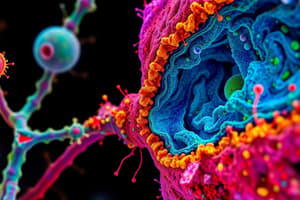Podcast
Questions and Answers
0
0
False (B)
0
0
False (B)
1
1
False (B)
2
2
3
3
What is the main purpose of a Transmission Electron Microscope (TEM)?
What is the main purpose of a Transmission Electron Microscope (TEM)?
How is the image in a Transmission Electron Microscope (TEM) enhanced?
How is the image in a Transmission Electron Microscope (TEM) enhanced?
What is the main difference between a Transmission Electron Microscope (TEM) and a Scanning Electron Microscope (SEM)?
What is the main difference between a Transmission Electron Microscope (TEM) and a Scanning Electron Microscope (SEM)?
How does a Scanning Electron Microscope (SEM) produce its images?
How does a Scanning Electron Microscope (SEM) produce its images?
Flashcards are hidden until you start studying
Study Notes
Transmission Electron Microscope (TEM)
- The primary purpose of a Transmission Electron Microscope (TEM) is to provide high-resolution images of the internal structure of specimens by transmitting electrons through the sample.
- TEM achieves image enhancement through contrast mechanisms, including phase contrast and absorption contrast, often aided by metal staining to increase electron density in certain areas.
Scanning Electron Microscope (SEM)
- The main distinction between TEM and Scanning Electron Microscope (SEM) is that SEM primarily scans the surface of samples to create three-dimensional images, while TEM focuses on internal structures.
- SEM generates images by directing a focused beam of electrons onto the specimen's surface, detecting secondary electrons emitted from the surface to construct detailed topographic images.
Studying That Suits You
Use AI to generate personalized quizzes and flashcards to suit your learning preferences.




